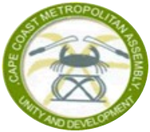Cape Coast, Ghana
|
Cape Coast, Oguaa City of Cape Coast |
||
|---|---|---|
| City | ||

1st Top-Left image; Arch bridge and Harbour view from Elmina Castle in Cape Coast • 2nd Bottom-Left image; City hall of Cape Coast • 1st Top-Right image; Shores of Cape Coast • 2nd Bottom-Right image; Balcony of Cape Coast Castle.
|
||
|
||
| Location of Cape Coast in Central Region, Ghana. | ||
| Coordinates: 05°06′00″N 01°15′00″W / 5.10000°N 1.25000°W | ||
| Country |
|
|
| Admin. Region | Central Region | |
| District | Cape Coast Metropolitan | |
| Founded | 1482 | |
| Elevation | 0 m (0 ft) | |
| Population (2012) | ||
| • Total | 169,894 | |
| • Demonym | Cape Coaster | |
| Time zone | GMT | |
| • Summer (DST) | GMT (UTC) | |
Cape Coast, or Cabo Corso, is a city and fishing port, and the capital of Cape Coast Metropolitan District and Central Region of south Ghana. Cape Coast is situated on its south to the Gulf of Guinea. Cape Coast had a settlement population of 169,894 people (2010 census). From the 16th century until Ghanaian independence, the city and fishing port changed hands between the British, the Portuguese, the Swedish, the Danish and the Dutch.
Cape Coast was founded by the people of Oguaa. The Portuguese built a trading fort in the area. In 1610 the Swedes built a lodge that would later become the better known Cape Coast Castle now a World Heritage Site. Most of the modern town expanded around it. The Dutch took it over in 1650, and expanded it in 1652. It was then captured by the British in 1664. Trade was an important motivator in the creation of fortresses and settlements on Cape Coast. Traders from various European countries built these trading lodges, forts and castles along the coast of modern Ghana. Unfortunately, the acquisition of gold, slaves, honey, and the many other African goods that consisted the African leg of the Triangular Trade was increasingly detrimental to the inhabitants of Cape Coast. In 1874, the British dominated all European presence along the coast of modern-day Ghana using Cape Coast as their base of operations, Gold Coast. With the establishment of formal colonial administration, they relocated to Accra following opposition to the "window tax" in 1877. Accra became their state. Cape Coast Castle was also where most of the slaves were held before their journey on the Middle Passage.
The area is dominated by batholith rock and is generally undulating with steep slopes. There are valleys of various streams between the hills, with Kakum being the largest stream.
...
Wikipedia


